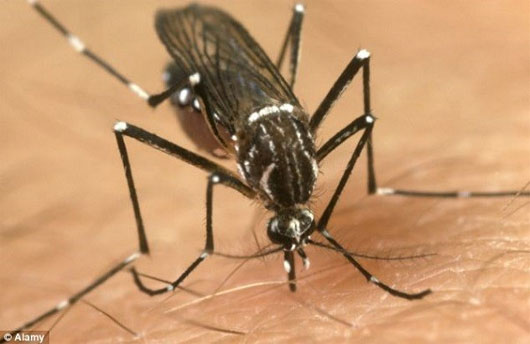Experiment with mosquitoes
Panama is expected to become the next country to test the use of genetically modified mosquitoes nicknamed "suicide mosquitoes" to fight diseases spread from these insects, especially dengue.
>>>Find new ways to control mosquitoes
Dengue, a disease often associated with tropical regions, is increasing worldwide, with new outbreaks occurring in both North America and Latin America. Mosquitoes carrying dengue virus have spread to 100 countries around the world and make about 2.5 billion people at risk. Statistics from the World Health Organization (WHO) show that about 50 to 100 million people suffer from dengue every year, of which about 25,000 deaths.
In Panama alone, a new dengue outbreak has claimed six lives this year. In an effort to fight the dangerous disease, this Latin American country plans to test a new tool - the genetically modified mosquito OX513A of British biotechnology company Oxitec.

Genetically modified mosquitoes contain a "death gene", causing its offspring to other normal female mosquitoes to be unable to survive.(Artwork: Health News)
Mosquitoes OX513A are actually genetically modified mosquitoes to contain a "death gene" . When these mosquitoes are all male, released naturally, they mate with normal female mosquitoes and give birth to babies. But, their descendants are unable to survive and transmit the disease.
The manufacturer claims, OX513A mosquitoes are not dangerous to humans, because they live on fruits, not blood. Genetically modified mosquitoes only live for a week, while regular mosquitoes have a lifespan of up to 1 month. Genetically modified mosquitoes can only last long when exposed to tetracycline antibiotics.
Mosquitoes OX513A have been tested in Cayman Islands, Malaysia and Brazil. In particular, officials at the Cayman conducted secret tests in 2009 and 2010, resulting in a reduction of up to 80% of the mosquito population in an experimental area.
In tests this year in the village of Mandacaru in the state of Bahia, northeastern Brazil, mosquitoes OX513A helped prevent 96% of the mosquitoes carrying dengue virus. However, the obvious drawback of genetically modified mosquitoes is that they are now able to affect only one type of mosquito.
Health experts warn that they need more tools to combat dengue and encourage pharmaceutical companies around the world to race to invent a vaccine to prevent the disease. However, the research process is thought to be very expensive and slow because there are four different types of viruses that cause dengue fever.
- The experiment destroyed most of the mosquitoes on the Chinese island
- Interesting findings about mosquitoes
- 10 interesting things about mosquitoes
- Why do humans not erase mosquitoes?
- Why do mosquitoes love to burn humans?
- Change the sex of the mosquito
- 'Eat - wear - stay' helps you kill mosquitoes thoroughly
- Why are mosquitoes sucking blood from HIV, mosquitoes not sick?
- Mosquitoes' mosquitoes to block malaria
- The most horrifying psychological experiment in history
- Spray mosquito repellent to watch for poisoning
- The paradox of flying mosquitoes makes them extremely scary
 Why do potatoes have eyes?
Why do potatoes have eyes? 'Tragedy' the world's largest carnivorous life: Death becomes ... public toilet
'Tragedy' the world's largest carnivorous life: Death becomes ... public toilet Tomatoes were once considered 'poisonous' for 200 years
Tomatoes were once considered 'poisonous' for 200 years Detecting microscopic parasites on human face
Detecting microscopic parasites on human face Shocking new research: Male mosquitoes can also suck blood!
Shocking new research: Male mosquitoes can also suck blood!  Los Angeles released 20,000 male mosquitoes to kill Aedes
Los Angeles released 20,000 male mosquitoes to kill Aedes  Paris seeks to eradicate mosquitoes before the Olympics
Paris seeks to eradicate mosquitoes before the Olympics  'Factory' produces 30 million mosquitoes a week, praised by Bill Gates
'Factory' produces 30 million mosquitoes a week, praised by Bill Gates  Interesting study: Sleep-deprived mosquitoes are also 'lazy' to suck the blood of humans and animals
Interesting study: Sleep-deprived mosquitoes are also 'lazy' to suck the blood of humans and animals  Breakthrough discovery on how mosquitoes choose 'victims' to suck blood
Breakthrough discovery on how mosquitoes choose 'victims' to suck blood 